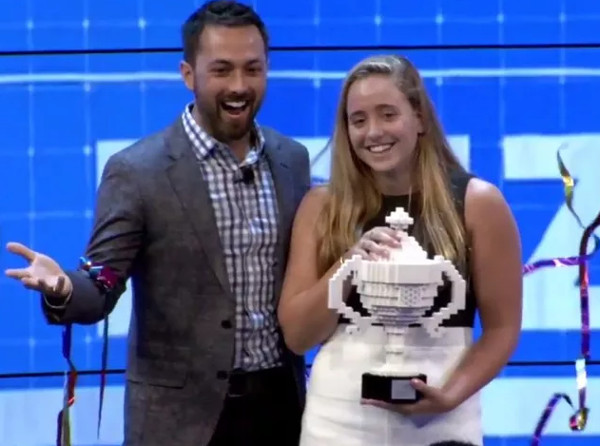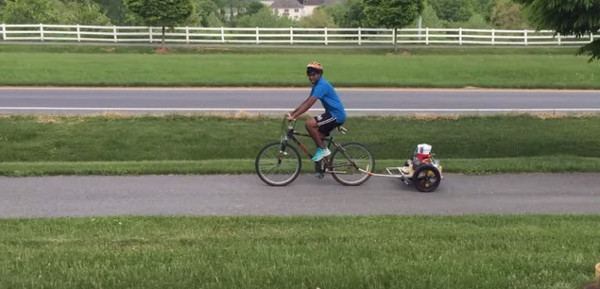9 faces less than 18 years old are promising to change the world
Young girls less than 18 years old are amazed the world with the invention against Ebola, cancer treatment or food crisis.
Young faces will change the face of the world in the future
Science Fair is Google's annual event, and this year is the 5th time to witness the shine of many young talents. The good news is that after 5 years of organization, the number of students attending and reaching the final round is increasing, coupled with the quality of scientific inventions is also increasingly improved. The most special thing of this year's Science Fair is Ahmed Mohamed's presence, the name that is 'floating like' around the world. This talented 14-year-old boy was invited by Google as an honor guest.
Head of the Google Science Fair - Ms. Mariette DiChristina - proudly stated: 'Supporting and encouraging young science talents is our first task. Here, you will have the opportunity to discover and surprise the world with valuable scientific inventions. '
1. Olivia Hallisey, 16 years old: Rapid test method of Ebola virus

This 16-year-old American girl is the author of the latest method to detect Ebola virus in just 30 minutes, at a cost of 25 USD. This invention won the biggest prize of a $ 50,000 scholarship at the Google Science Fair. The current Ebola detection method costs only 1 USD but requires complex equipment and requires up to 12 hours to diagnose the disease. She also said that according to estimates, early diagnosis and treatment of Ebola could reduce the death rate from this virus from 90% to 50%.
2. Anurudh Ganesan, 15 years old: New vaccine transport method

A new method of transporting vaccines has also been won at the Science Fair this year. That is the product of the boy Anurudh Ganesan. Currently, vaccine carriers often have to work very hard to meet all strict conditions such as temperature, humidity . in order to preserve the vaccine in the best condition. However, the locations where vaccines are needed are often very remote, so cold storage measures do not fail. It was this that caused Ganesan to come up with the idea of cooling with a very simple compression. Just a very small impact force makes this system work, saving maximum manpower.
3. Eliott Sarrey, 14 years old: Gardening robot

French boy Eliott Sarrey also won the prize for his robot-making Bot2Karot garden invention . The idea came when Sarrey wanted to find a way to cultivate less time and effort. Finally, thanks to the design of a smartphone-controlled garden robot, he won the $ 10,000 prize from the Science Fair this time. In particular, his project received a long-term sponsorship from Google. This boy's agricultural interest is still burning when in the future, he wants to build a model of automatic chicken coop.
4. Kenneth Shinozuka, 15 years old: A method to support Alzheimer's patients

In 2014, 15-year-old Kenneth Shinozuka made a lot of attention when introducing a method to help care for Alzheimer's patients effectively, helping patients to not wake up and stray at night. Worried about his grandfather - who is Alzheimer's - often unconscious out of the house at night, boy Shinozuka designed an automatic signaling system on his relatives' smartphones, to inform them of each time the patient came out. off the bed. In addition to Google, President Obama himself has personally awarded this invention by Shinozuka at the White House's March 2015 Science Fair.
5. Ciara Judge, Sophie Healy-Thow and Emer Hickey, 16-17 years: Microbial methods of cultivation

Last year, three teenage girls from Ireland won the grand prize of Google when there was a microbial . initiative, a very potential method to solve the current world food crisis. This young group spent a year studying and demonstrating the role of beneficial bacteria in promoting the development of cultivated seeds.
6. Girish Kumar, 17 years old: Automated education question system

The automatic RevUP question system in the field of education has earned the proud Girish Kumar of Google. This Singaporean boy has programmed and successfully developed RevUP software, a system that selects information from mainstream educational websites to create multiple questionnaires in many different areas. Kumar won a $ 25,000 scholarship from Google with a year of study at the technology company.
7. Eric Chen, 17 years old: A method to prevent and treat flu

Eric Chen won the Google Science Fair 2013 thanks to a new method of preventing and treating flu. The 17-year-old uses a computer program and biological testing method to create a drug that inhibits the flu virus, thereby preventing the virus from spreading. Soon after, Chen also won Intel's science talent search program. Last year, he enrolled at Harvard University in fame.
8. Brittany Wenger, 17 years old: Computer system for diagnosing breast cancer

Although less than 18 years old, Brittany Wenger has successfully created a cloud-based 'brain' to diagnose breast cancer. As a result, she won the grand prize of Google in 2012. This program is programmed by Wenger based on the neural network model of the brain, the technology used by Google to identify images. Currently, Wenger is studying at Duke University and her "Cloud for Cancer" cancer diagnosis tool is still being maintained.
9. Shree Bose, 17 years old: The method of treating ovarian cancer

The first Google Science Fair grand prize in 2011 went to 17-year-old Shree Bose with a study on the treatment of ovarian cancer. This work focuses on the resistance of cancer cells to determine and control the change of cancer cells - from response to resistance to chemotherapy. As a result, she found a way to suppress cancer cell proteins to aid in destroying cancer cells. Since the resounding victory at Google, Bose co-founded a startup that teaches kids to program themselves on computers. Currently, she is a final year student at Harvard University and plans to continue pursuing medicine after graduation.
- How will the American face change in 2050?
- Horses know how to read people's emotions
- Face primate and social life
- Take pictures of smiling faces in the universe
- Who lived 13,600 years ago, the oldest in America looked like this?
- Recreate dinosaur faces from chickens
- 2118: This will be what happens to our world after 100 years
- The mysterious face of a giant face appears on Mars
- Marching for climate change around the world
- Explain the illusion of faces appearing on objects
- Look at the quality of the
- The face of the real person lived thousands of years ago, 'beautiful every millimeter' caused many people to be deceived
 The most famous scientific failures in history
The most famous scientific failures in history Mysterious genius mechanic and the machine froze time
Mysterious genius mechanic and the machine froze time The son carries the 'bad gene' of genius Albert Einstein
The son carries the 'bad gene' of genius Albert Einstein Isaac Newton
Isaac Newton Peru claims to have the world's oldest people
Peru claims to have the world's oldest people  Set of photos of children's bedrooms around the world with unexpected differences
Set of photos of children's bedrooms around the world with unexpected differences  What do children around the world eat for a week? The unique set of photos captures a lot of interesting things
What do children around the world eat for a week? The unique set of photos captures a lot of interesting things  Strange man has 10 different personalities
Strange man has 10 different personalities  New black gold in Nigeria: Used car tires
New black gold in Nigeria: Used car tires  Startled food thousands of years old can still be eaten
Startled food thousands of years old can still be eaten 